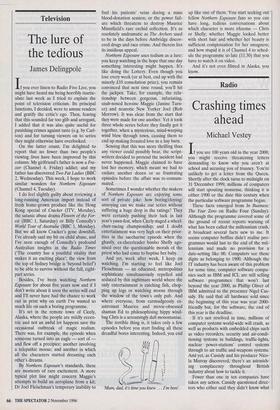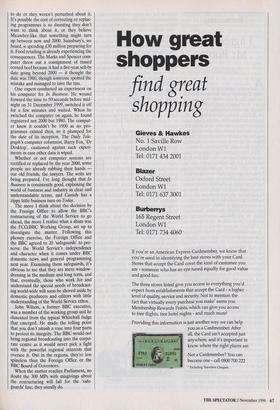Radio
Crashing times ahead
Michael Vestey
If you are 100 years old in the year 2000, you might receive threatening letters demanding to know why you aren't at school and accusing you of truancy. You're unlikely to get a letter from the Queen. Shortly after the clock turns to midnight on 31 December 1999, millions of computers will start spouting nonsense, thinking it is either 1900 or the date this century when the particular software programme began.
These facts emerged from In Business: The Year Zero on Radio Four (Sunday). Although the programme covered some of the ground of recent reports warning of what has been called the millennium crash, it broadcast several facts new to me. It seems computer boffins didn't realise pro- grammes would last to the end of the mil- lennium and made no provision for a date-setting like 00. Computers see these digits as belonging to 1900. Although the IT industry has been aware of this problem for some time, computer software compa- nies such as IBM and ICL are still selling software programmes that won't last beyond the year 2000, as Phillip Oliver of IBM admitted to the presenter Nigel Cas- sidy. He said that all hardware sold since the beginning of this year was year 2000- friendly but, for the software, the end of this year is the deadline.
If it's not resolved in time, millions of computer systems world-wide will crash, as well as products with embedded chips such as video recorders, security and air-condi- tioning systems in buildings, traffic-lights, nuclear power-stations' control systems through to air traffic and weapons systems. And yet, as Cassidy and his producer Nico- la Murray discovered, there's an astonish- ing complacency throughout British industry about how to tackle it.
Fewer than one in ten companies have taken any action. Cassidy questioned direc- tors who either said they didn't know what to do or they weren't perturbed about it. It's possible the cost of correcting or replac- ing programmes is so daunting they don't want to think about it, or they believe Micawber-like that something might turn up between now and 2000. Sainsbury's, we heard, is spending £30 million preparing for it. Food retailing is already experiencing the consequences. The Marks and Spencer com- puter threw out a consignment of tinned corned beef because it had a five-year sell-by date going beyond 2000 — it thought the date was 1900, though someone spotted the mistake and managed to save the tins.
One expert conducted an experiment on his computer for In Business. He wound forward the time to 50 seconds before mid- night on 31 December 1999, switched it off for a few minutes and waited. When he switched the computer on again, he found registered not 2000 but 1980. The comput- er knew it couldn't be 1900 as no pro- grammes existed then, so it plumped for the date of its inception. The Daily Tele- graph's computer columnist, Barry Fox, 'Dr Desktop', cautioned against such experi- ments in case other data is wiped.
Whether or not computer systems are rectified or replaced by the year 2000, some people are already rubbing their hands our old friends, the lawyers. The writs are being prepared. I've long thought that In Business is consistently good, explaining the world of business and industry in clear and understandable terms, and Cassidy has a zippy little business turn on Today. The more I think about the decision by the Foreign Office to allow the BBC's restructuring of the World Service to go ahead, the more I realise what a sham was the FC0/BEC Working Group, set up to investigate the matter. Following this phoney exercise, the Foreign Office and the BBC agreed to 20 'safeguards' to pre- serve the World Service's independence and character when it comes under BBC domestic news and general programming next year. Examining these safeguards, it's obvious to me that they are mere window- dressing in the medium and long term, and that, eventually, those who work for and understand the special needs of broadcast- ing world-wide will soon be shoved aside by domestic producers and editors with little understanding of the World Service ethos.
John Wilson, a former BBC executive, was a member of the working group and he dissented from the typical Whitehall fudge that emerged. He made the telling point that you don't smash a vase into four parts to protect its integrity. The BBC would not bring regional broadcasting into the corpo- rate centre as it would never pick a fight with the powerful regional interests that oversee it. Out in the regions, they're less spineless than the Foreign Office or the BBC Board of Governors.
When the matter reaches Parliament, no doubt the 300 MPs with misgivings about the restructuring will fall for the 'safe- guards' line; they usually do.



















































































 Previous page
Previous page